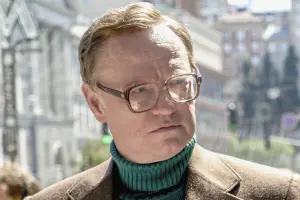Chernobyl became this year's scariest show, with terror injected into the most benign of things
-

"With every episode, HBO’s chronicle of the 1986 disaster has broadened its scope to investigate, often horrifically, the breadth of the radioactive incident as it impacted the individual, the environment, and the next generation," Randall Colburn says of HBO's limited series on the Chernobyl nuclear disaster that concluded Monday. He adds: "It’s rare to find entertainment that imbues import into the mundane so well. Under the exquisite direction of Johan Renck, who cut his teeth on episodes of Breaking Bad and Vikings, terror is injected into the most benign of things—in the irradiated world of Chernobyl, where the air is poison, tree branches ominously swaying in the wind prophesy doom, while dusty chunks of graphite laze like cancerous landmines. This is the horror of Chernobyl, which immerses us in a world where every breath, every object, every exposed cell beckons death. The slasher is much more scary when his fatal cuts strike you silently, painlessly."
ALSO:
- Chernobyl got some things right, but it got some important things terribly wrong: "Herein lies one of the series’ biggest flaws: its failure to accurately portray Soviet relationships of power," says Russian-American journalist Masha Gessen. While there are flashes of brilliance, Chernobyl "often veers between caricature and folly," she says, adding: "There are a lot of people throughout the series who appear to act out of fear of being shot. This is inaccurate: summary executions, or even delayed executions on orders of a single apparatchik, were not a feature of Soviet life after the nineteen-thirties. By and large, Soviet people did what they were told without being threatened with guns or any punishment. Similarly repetitive and ridiculous are the many scenes of heroic scientists confronting intransigent bureaucrats by explicitly criticizing the Soviet system of decision-making."
- Chernobyl is peak horror: "Chernobyl may just be too raw and too harrowing to be considered 'essential viewing,'" says Tom Philip, "but this is a recent and very real disaster that a lot of us only know about in bits and pieces. More urgently, in this age of governmental secrecy, misinformation, and instability, we might need to take a few more notes than we'd like from this gruesome, unthinkable, but all too true horror story."
- The Chernobyl finale was a haunting lesson on the cost of lies
- It is especially important not to process everything in Chernobyl through the lens of our current politics
- Chernobyl is the best HBO series in years -- it never faltered in its five episodes
- A New York Times science writer who toured Chernobyl in 2014 explains what the HBO series got wrong and right
- If Chernobyl had a tagline it would probably be “Wait! It gets worse"
More Chernobyl on Primetimer:- The "Evil Russian" stereotype has persisted on shows like Devs, despite "humanizing" Russian portrayals on The Americans and Chernobyl
- Republican Congressman Dan Crenshaw: Liberals don't like nuclear energy "because they watch The Simpsons or Chernobyl"
- How TV show companion podcasts became all the rage
- Chernobyl star Paul Ritter dies at 54
